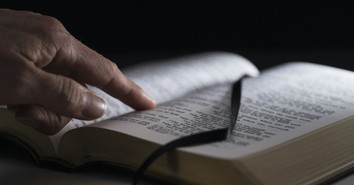Why Is There No Rest for the Wicked?

Whether you’ve heard it in a song or from your grandparents or seen it referenced in a book, the chances are pretty good that you’ve heard that this “no rest for the wicked.” The phrase has been quoted, misread, and even parodied in many ways over the years. You’ve likely been told that it’s a biblical idea. But is that correct? What does it actually mean that there is no rest for the wicked?
To answer that, we need to consider whether the phrase actually appears in the Bible and if so what it means in context.
What Does 'No Rest for the Wicked' Mean in the Bible?
Technically, “no rest for the wicked” doesn’t appear in the Bible. It’s a corruption of a phrase in Isaiah 57:20-21, which reads:
“But the wicked are like the tossing sea, which cannot rest, whose waves cast up mire and mud. ‘There is no peace,’ says my God, ‘for the wicked.’”
This section of Isaiah 57 begins in verse 14 by talking about how God will “revive the spirit of the lowly” (57:15) and heal those who turn to him, while the wicked will not find that healing.
If you look across the whole chapter and at the ones immediately before and after it, you’ll see that this is part of a larger message in Isaiah which contrasts two ways of living. There are the people who pursue God and desire goodness (who God helps) and the people who pursue idols for strength (who ultimately don’t get help).
What Is the Context of Isaiah 57:21?
The Hebrew word used for “peace” in this verse is shalom, which has very powerful connotations. Its first meaning is health, and in that context, it means healing or deliverance. People in modern-day Israel still use “shalom” as a greeting or a good-bye, a way of saying “peace be with you.”
Although shalom can just mean having good health, the Bible particularly uses it to talk about peace or deliverance that comes from God. It is the word Isaiah uses earlier in chapter 9, when he describes the Messiah:
“For to us a child is born, to us a son is given, and the government will be on his shoulders. And he will be called Wonderful Counselor, Mighty God, Everlasting Father, Prince of Peace” (Isaiah 9:6).
In Judges 6:24, after God speaks to Gideon to tell him how God will use him, Gideon builds an altar which he names Jehovah-Shalom (“the Lord is Peace”).
This idea that shalom means God-given peace fits with Isaiah 57’s description of those who follow God versus those who don’t. It highlights that the wicked will not find peace, because they are not pursuing it.
More specifically, Isaiah is speaking to a certain group of people who have a special relationship with God: the Israelites. At this point in Isaiah, Israel has been invaded by Babylonians, who took the Israelites into exile (see Isaiah 39 for the backstory on this).
In the chapters leading up to Isaiah 57, the writer talks about how despite the current situation (Babylonians ruling, Israelites captured), God will change things. Isaiah 46-57 talks about how Babylon will be defeated, Isaiah 48 onward talks about Israel being restored. Since at this point the Israelites are exiled in a country with various other religions and idols to follow, we can reasonably say that Isaiah is warning the Israelites not to give up on their heritage. They may be tempted to follow the Babylonian gods and way of life, but if they do so, they will not find peace. Eventually, Isaiah promises, God will restore the nation as a whole and those who pursue him will find what they need.
Therefore, in context, Isaiah 57:21 is saying that God’s peace will not be with people who worship other gods and live sinfully. God’s peace will be with people who pursue him. While Isaiah is particularly talking to the Israelites and it is important that we remember that, the point applies to humanity in general.
What Does the Bible Say about Wicked People?
Generally speaking, there are two ways the Bible talks about wickedness: the wickedness done by people as a whole, and the wickedness done by his chosen people.
After Israel makes a covenant with God on Mount Sinai (Exodus 19-31), they become his chosen people. Since the covenant sets up God as Israel’s protector as long as they follow him, anytime that the Israelites start to follow other gods there are serious consequences. Isaiah particularly highlights this point because, like many of the Old Testament books of prophecy, it goes between descriptions of how the nation as a whole suffers when the Israelites disobey God and how God will bless the nation as a whole as they return to him.
On a more basic level, the Bible talks a great deal about the consequences of sin. From the moment that Adam and Eve sinned in the Garden of Eden (Genesis 3), human beings have been sinners (Romans 3:23). We all do wicked things; none of our good actions can make up for the sins that we commit (Isaiah 64:6). We all need salvation. Therefore, it’s appropriate that the Bible routinely talks about wicked people ultimately not prospering. People may not necessarily be punished for their sins during this lifetime, but in the end analysis “the evil man has no future hope, the lamp of the wicked will be snuffed out” (Proverbs 24:20).
What about Sin Makes it Hard to Get Sleep at Night?
Our sin affects our lives in various ways. Since we each have a sinful nature (Romans 3:23) and tend to do what is self-serving, we are not always troubled by the sinful things we do.
At the same time, the Bible affirms that we have some innate sense of right and wrong. Paul talks about this in Romans 2:14-15, describing Gentiles who do not have the Jewish law but “do by nature things required by the law” which “show that the requirements of the law are written on their hearts.” Therefore, there are certain things we all know are wrong and we should be disturbed when we do those wrong things.
However, we can deaden our consciences in many ways. We can find ways to justify our sin. We can live in sinful ways long enough that sin doesn’t bother us. Ultimately then, we will find that even if we grew up in a religious environment, we will still have sinful patterns we need to deal with. We must all be renewed and remade in Christ.
As we develop a deeper walk with God, our moral consciences should develop. We should find that we become bothered by sins we commit and motivated to repent, confess and do what we can to make things right. Depending on what sins we have committed or our temperaments, we may find that unrepentant sin makes it hard to sleep. Our consciences should become restless if there is active sin in our lives.
However, losing rest and stressing about sins after we have repented and sought forgiveness (thinking about them constantly, etc.) is not a healthy response. That is likely a sign that we struggle with shame. Shame tries to tell us that we are tainted by the sins we have done, that we are somehow corrupted, and cannot be fixed. The Bible informs us that in fact “there is no shame for those who are in Christ Jesus” (Romans 8:1) and that having been redeemed, we have nothing to feel shameful about.
We may still feel guilty at the things we’ve done (in fact, we should). Guilt is our moral consciences reminding us to repent and make things right, a healthy reminder that we must take our sins to God. Depending on what sins we have committed and the damage we face, we may feel regret and grieve what happened for a while. However, if we obsessing over what we’ve done and can’t move past it, that indicates we are experiencing shame. We don’t need to feel shame at the sins we’ve done, because Jesus has already paid for those sins on the cross.
Further Reading
Is There Really "No Rest for the Wicked" in the Bible?
What Does it Mean "There Is No Rest for the Wicked"?
Photo credit: ©GettyImages/Tero Vesalainen

This article is part of our larger resource library of popular Bible verse phrases and quotes. We want to provide easy to read articles that answer your questions about the meaning, origin, and history of specific verses within Scripture's context. It is our hope that these will help you better understand the meaning and purpose of God's Word in relation to your life today.
"Be Still and Know that I Am God"
"Pray Without Ceasing"
"Fearfully and Wonderfully Made"
"All Things Work Together for Good"
"Do Not Fear"
Originally published April 05, 2021.







